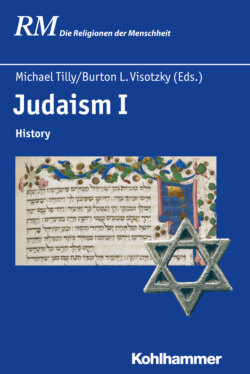Читать книгу Judaism I - Группа авторов - Страница 54
На сайте Литреса книга снята с продажи.
4.2 History of research47
ОглавлениеIn the question of the causes of the Maccabean uprising, a key role was played by two components, and their weighing has led to divergent, often contradictory views: the role of King Antiochus IV and that of the Jerusalem temple aristocracy in the abolition or transformation of the Judaic religion at the Jerusalem temple. While earlier research48 saw in Antiochus IV the driving force in the replacement of the God of Israel by Zeus Olympios at the Jerusalem temple, this view was completely overturned by Elias Bickermann.49 Because of the Hellenization of Judea, already of long duration, the reform of the Jerusalem cult started in High priestly groups associated with Jason, who bought his High priesthood and the establishment of a gymnasium from the king with ephebeia. The High priest Menelaus took the Hellenization of the cult to a radical conclusion. The God of Israel was equated with the Syrians’ Baal Shamem and the Greeks’ Zeus Olympios:
Just like the uncorrupted children of nature of Greek theory, the ›sons of the Acra,‹ i.e. Menelaus and his partisans, thus worshipped the heavenly god of their ancestors without temple and images, under the open sky upon the altar which stood on Mt. Zion. They were free from the yoke of the law, and in mutual tolerance they were united with the Gentiles. What could be more human, what could be more natural, than their desire to force this tolerance also upon those of their coreligionists who were still unenlightened? That was the persecution of Epiphanes.50
The resistance of the Hasmoneans had then been directed against these reform efforts of the Jerusalem temple aristocracy. Victor Tcherikover51 adopted this assessment of the Hellenization of the Jerusalem aristocracy, who came into conflict with the still tradition-minded people, leading to civil war. With the help of a Syrian military settlement on the Akra, who were worshiping the Syrian God of heaven, Baal Shamem, Antiochus IV then reacted. Antiochus IV took the religious resistance of the Hasmoneans to be directed against his rule and therefore prohibited the Jewish religion. In the conflict between Antiochus IV, the Jerusalem aristocracy, and Hasmoneans, further variants may be identified. Jochen Gabriel Bunge52 thinks what triggered the Maccabean revolt was the self-deification of Antiochus IV and the compliance of the Hellenized Jerusalem upper class. Klaus Bringmann,53 on the other hand, blamed the religious prohibition of the king on political squabbles between the High priests Jason and Menelaus. Further research54 has produced different evaluations of the political and religious aspects and turned increasingly to assessments of the source situation. First Maccabees can be seen as »narrative composition with an intentional reference to reality«55 and the religious persecution as a myth, behind which stands the violent suppression of a popular uprising.56 For Sylvie Honigman, elements of the sources that may lie behind the historical events do not amount to much: the naming of the temple after Zeus Olympius, the desecration of the altar, the suspension of the daily sacrifices and sabbaths and festivals, the »abomination of desolation« taking the place of the sacrifices, the monthly sacrifice in honor of the king, pagan altars in the city and countryside, the killing of those who resisted land expropriation. »The rest (…) is literary embellishment.«57
